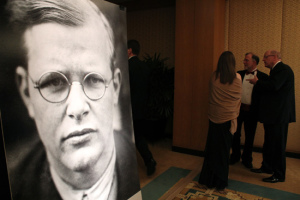Is God a therapist?

Archbishop Chaput recently wrote that holiness, above and beyond all other things, should mark the Church and her members.
It was an encouraging reminder that, in an age when church leadership is often characterized by bureaucratic skills rather than piety, the Lord has yet a few who have not bowed their knee to the various Baals of efficiency, wokeism, and wonkery. And though the archbishop did not make this point explicit, it is clear that holiness is a corollary of a high and orthodox doctrine of God.
At this moment in time, Christian churches face an unprecedented challenge. Western nations have (with few exceptions) experienced the collapse of the broad moral vision that made them coherent entities. This collapse means that even the most basic terms of membership in wider society are increasingly antithetical to the most basic terms of membership in the Church. Some deny that this is happening, but they tend to be those who enjoy what we might term “progressive privilege” — temporary protection from the left’s culture warriors because they engage in ritual acts of Christian self-loathing and focus only on the doctrines that comport nicely with whatever is the bien-pensant penchant of the day.
But the changeling morality of the secular elite is a fickle mistress. Progressive Christians will learn, as did the liberal Christians of a previous generation, that conceding too much is never enough for Christianity’s enemies.
I would anticipate that within five years we will witness a significant disruption across all major representatives of the Christian faith. The fault lines will run between those who find a way to accommodate to the world’s terms of good citizenship and those whose fidelity to Christ will lead to varying degrees of internal exile within this earthly city. The former will ultimately accept the collapse of biblical anthropology, repudiating its implications for sexual morality, for human identity, and for addressing the various socially constructed problems we now face, such as those of race and gender. The latter will maintain Christian teaching and be decried as being at best naïve, at worst bigoted.
How should we prepare to stand in the face of what is to come? I agree with Archbishop Chaput that holiness and devotion must mark the Church’s witness. After all, if we do not take the faith seriously, how can we expect others to do the same? Furthermore, holiness is not simply, or even primarily, an apologetic strategy. It is in part a response to the doctrine of God. Only when we grasp this can we truly place our own lives in perspective and anchor our faith so as to resist the cultural moment. If our imaginations are not fired by the greatness of the eternal communion with our glorious God that will be consummated at the end of time, then the problems of this present age will loom large and always threaten to overwhelm us.
I pondered this last Sunday, when I had the privilege of leading an outdoor worship service in the Agora in Corinth, the scene of one of St. Paul’s famous addresses. I noticed a stone there upon which the text of 2 Corinthians 4:18 is engraved both in Greek and English: “For this slight, momentary affliction is preparing for us an eternal weight of glory beyond all comparison.” Paul truly suffered — as the litany of trials he recounts in 2 Corinthians demonstrates — and yet his suffering was to him like a small thing because his God was very great.
That great God is in short supply among those who profess to be Christians today. The anthropomorphic godlet of so much modern evangelicalism is a sad substitute for the Christian God of the Nicene fathers. Even more damaging is God the Therapist, a function of the modern cult of victimhood that has deprived us of the ability to distinguish the real suffering epitomized by the true martyrs from the trivial discomforts that the social media generation now routinely parades as martyrdom. Both approaches — approaches that ultimately make man the measure of all things — must be repudiated.
And so if the Church wishes to cultivate her people’s holiness, she must instill in them a glorious and beautiful doctrine of God, one that so grips their imaginations that it carries them out of themselves and to the very portals of Heaven. How can this be done? First, the Church must clearly understand the doctrine of God and its significance. God’s incomprehensibility; His existence as Father, Son, and Holy Spirit; and His glorious self-sufficiency must be clearly proclaimed in the Church’s preaching, her creedal confession, and her liturgical worship. Christians often praise God primarily for what He has done, does, and will do. But we should also praise Him merely for who He is. And that means the Church needs leaders that are deeply read in the doctrine of God and familiar with the awe-inspiring texts of Athanasius, the Cappadocians, John Chrysostom, Cyril of Alexandria, Anselm, and their ilk.
Second, worship must be serious and adult. Ours is a childish age with a consequent tendency to remake God in a childish form. So He becomes “the big man upstairs” to every sports player who thinks God’s priority is paving the way for a championship; or the cosmic boyfriend addressed in countless contemporary Christian songs; or the great shoulder to cry on for everybody who has been subject to a nasty comment on social media. But we worship the God who speaks (most untherapeutically) to suffering Job out of the whirlwind and silences the poor man in the midst of his agony.
This is no childish God but a mysterious and terrifying one, and our worship should reflect that fact. As the Church’s leaders must learn great theology, so must they lead the people into the same via the prayers, the hymns and the proclamation of God in word and sacrament.
Third, Christians need to put our own lives in perspective before this God. The greater our understanding of God’s transcendent mystery, the greater will be our understanding of His immanent grace as shown to us in the Lord Jesus Christ. A trivial God is a God of trivial actions. The Triune God of glory is a God of glorious Trinitarian grace. Only as we bow in awe before such a God will our present sufferings seem but light and momentary. Only then will holiness be the obvious mark of the Church.
Originally published at First Things.
Carl R. Trueman is a professor of biblical and religious studies at Grove City College. He is an esteemed church historian and previously served as the William E. Simon Fellow in Religion and Public Life at Princeton University. Trueman has authored or edited more than a dozen books, including The Rise and Triumpth of the Modern Self, The Creedal Imperative, Luther on the Christian Life, and Histories and Fallacies.




























